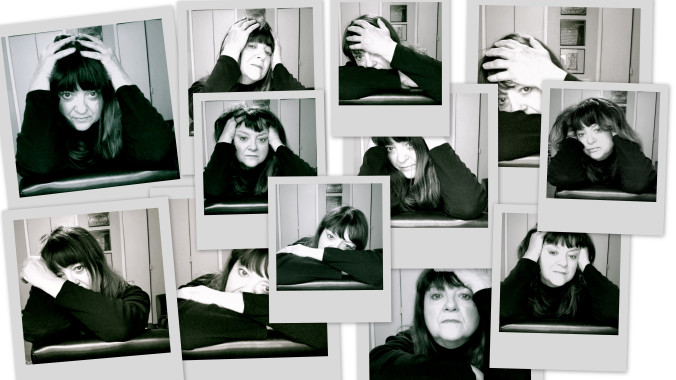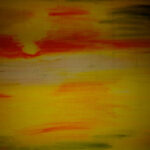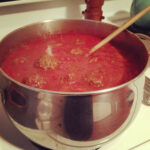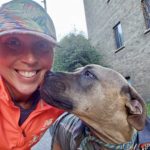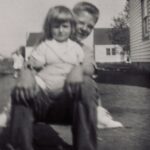This morning I woke up. Thank God. As I was making the bed I thought about my plans for the day. Making a cup of cinnamon coffee. Writing my blog. Banking with E. Shoe shopping with M. The first two items on the list made me happy. The third, not so much. The fourth delighted me.
Then I had this thought. My two daughters are my best friends. Then I had this thought. I wonder if they’d find that pathetic. I know I’m not theirs. Nor should I be at their ages. Then I had this thought. My mother was my best friend. Then I had this thought. When she died I not only lost my mother, I lost my best friend. Then I had this thought. That blows.
Then I started to cry. Bawled my fucking brains out as I was making the bed. The whole nine yards. Messy tears and snot all over my face, the pillows, sheets and my new shabby chic comforter. Which by the way, was incapable of providing neither the degree, nor the depth, of comfort required to stop this sorrowful eruption of muck and mournfulness.
Then I had this thought. I’m sad. Probably even depressed.
I come by this melancholy honestly. Not that he talked about it. Not ever. But I think The Old Man was depressed, most of his adult life. Maybe it was because he was Finnish. Their suicide rates are high, especially in the winter, which is long, cold and dark. Much like Northwestern Ontario, where he lived his entire life. I got out when I was twenty-four. It was too dreary for me. On so many levels I can’t even begin to describe.
What caused his depression? Who knows. I can only speculate. One part environment. One part DNA. One party magical mystery tour.
The Old Man sought refuge and relief from his misery in alcohol, watching sports on TV, buying new shoes, eating anything laced with sugar, swearing at inanimate objects, going to church on Sundays, shoveling snow in the winter and digging in his garden in the summer, umpiring little league games, taking long Sunday drives, scratching our dog’s belly, and sleeping. The older he got the more he slept. He was often antisocial, spending long hours alone in the spare room, behind closed doors watching TV or reading the daily newspaper. There was a Hammond Organ in that room that he tinkered with but never really learned to play. (However, he was an accomplished spoon percussionist.) The memory of that room, and his self-imposed exile and isolation, makes me sad.
People didn’t talk about their feelings back then. Men especially, kept things under wraps. Stiff upper lips and pulled up boot straps. The Old Man stuffed his sadness inside a profusion of plaid flannel shirts, only to unleash it every three months like clockwork, after a long night at the neighborhood saloon. The Crest on Red River Road. Instead of manifesting in tears, his hurt took a far darker, menacing form. He’d come home seething with anger. Uncontrollable rage. He never hit anyone because we was like a small yapping dog. All bark and no bite. But he ranted relentlessly and bullied the shit out of Ma and her kids. He was an unholy terror. It was one hell of a time.
During those dark nights of the soul, I hated him. Wished him dead. Prayed to God to strike him down with a bolt of lightening. A precise and explicit message from heaven. But that didn’t happen. Thankfully. Because the truth is, The Old Man was a good man when he wasn’t drinking. He had a kind, tender and sensitive heart, and he loved his family fiercely.
And he was ill.
An alcoholic. But the alcohol was merely self-medication. The deeper illness was depression. It makes me sad now to think that we didn’t know that. I mean, we knew intimately the subject matter of his rum and coke induced rages. The things that angered and tormented him. But we never understood why. Our family knew very little about the pathology of alcoholism as a disease. And even less about depression. Back then depressed people were crazy. Plain and simple. It was far better to be a self-pitying miserable alcoholic.
Over the years, I’ve often wondered if while I was praying to God to strike him dead, if he was doing the same thing. He went to church every Sunday. What were his prayers? Did he pray for help? Beg for healing? Did he seek forgiveness? Did he find comfort there? Did it any of it help? I hope so.
So here I sit. Years and miles away from Northwestern Ontario. Daylight is breaking. How do I deal with my sadness? This depression? The tears that stain my cheeks and cover my shabby chic comforter?
I do this. I write. I run. I do yoga. I take long walks along quiet country roads. I take photographs. I play with my dogs. I love my family fiercely. I eat well. I take vitamins. I talk to my wise girlfriends about deep dark feelings. I pour my heart out to my husband. I listen to my children and look for clues on how to live a joyful life. I laugh my guts out. I pray. I meditate. I write letters to God. I count my blessings. I get up, go to work and give it my very best shot. I play my guitar and my clarinet. I read books. Listen to music. I dream. I hang out. I waste time. I watch TV.
But I don’t drink alcohol. I don’t do drugs, except for the occasional ibuprofen. I do my best to stay away from sugar, especially white. I don’t give myself pep talks. They don’t work. I also don’t scold. Engage in self-pity, self-loathing or self-flagellation. I watch my inner dialogue. I try not to spend too much time alone in this room. Although that’s challenging because one of the things I love to do most requires that I spend long stretches of time in isolation.
Over the years I have found solace in motivational books and tapes, teachers, preachers, the wise and the enlightened. I’ve learned acceptance. Of what was. And what is.
Will I ever be completely free from depression and sadness? No. The truth is, I don’t want to be fully extricated. It’s part of who I am. Like my hazel eyes and crooked smile. It’s the fuel that fires some of my richest writing. The fountainhead of a few of my best ideas. My literary wellspring. It’s what allows me to feel things deeply. Not just my suffering. But yours. And yours. And yours. I shed tears for all living creatures. Even the dead rats I come across on the country road I walk. I like that about me.
Depression reminds me of my humanness. My weaknesses and strengths. It dictates that, in order to stay healthy, I must stay connected. It opens the eyes of my heart. And unleashes love, kindness, compassion, forgiveness, hope. And above all. Empathy.
I get it Dad. I get your pain.

